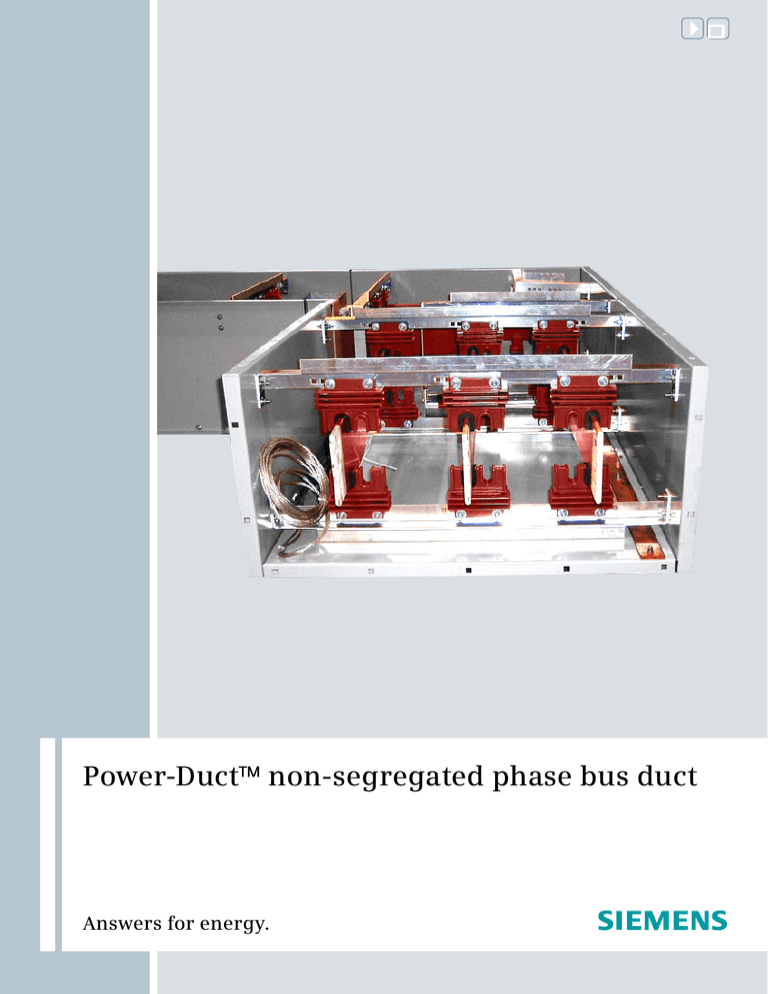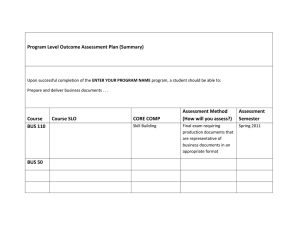
Power-Duct™ non-segregated phase bus duct
Answers for energy.
Figure 1: Siemens Power-Duct™
non-segregated phase bus duct ‒
narrow chassis (top) and
traditional (bottom)
Power-Duct™ non-segregated phase bus duct
Introduction
Features and options
Siemens Power-DuctTM non-segregated
phase bus duct is a metal-enclosed, nonsegregated phase bus designed
specifically for 600 V, 5 kV or 15 kV
applications customized to your project
specifications.
Standard features include:
11-gauge steel or 1/8" aluminum
construction
Removable covers
Siemens engineered medium-voltage
bus bar supports
Siemens offers both traditional bus duct
and narrow chassis bus duct, that are
capable of meeting most medium-voltage
requirements with a small, lightweight
design that lends itself to user-friendly
installation.
Siemens Power-Duct non-segregated
phase bus duct is intended for
applications requiring greater
dependability, such as connections
among rotating equipment, transformers,
switchgear and motor control centers.
Siemens manufactures the bus duct while
building your other electrical equipment
to help integration with said components
while maintaining your project schedule.
With dimensional drawings, Siemens can
deliver bus duct in weeks rather than
months.
2
Polyester powder coat paint system
99 percent plus conductivity copper
bars
Built to ANSI standards
UL Listed:
600 V, up to 4,000 A
5 kV, up to 3,000 A.
Options available include:
Aluminum or stainless steel housing
Special paint colors available upon
request.
Figure 2: Typical Power-Duct™ non-segregated phase bus duct to equipment transition
Description and application
Description
The non-segregated phase bus duct is an
assembly of bus conductors without
inter-phase barriers. All of the associated
connections, joints and insulating
supports are contained within a metal
enclosure.
Siemens Power-Duct™ non-segregated
phase bus duct is designed for 600 V,
5 kV and 15 kV service in accordance
with ANSI/IEEE C37.23. Continuous
current ratings available include 1,200 A
to 3,000 A for 5 kV through 15 kV and
1,200 A to 4,000 A for 600 V.
All conductors are separated and isolated
from each other by insulating bus
supports.
Every conductor for 2.4 kV and above is
insulated with an epoxy coating to reduce
corona and electrical tracking.
Multiple enclosure sizes are available to
meet your specific requirements. Lowvoltage application dimensions available:
14” (356 mm) x 21” (533 mm)
(1,200 A-3,000 A)
16” (406 mm) x 31” (787 mm)
(4,000 A).
Medium-voltage application dimensions
available:
12” (305 mm) x 24” (610 mm)
(1,200 A ND (narrow design))
16” (406 mm) x 33” (838 mm)
(1,200 A-3,000 A).
Application
Siemens Power-Duct non-segregated
phase bus duct can be used for
connections from transformers to
switchgear assemblies in unit
substations, switchgear assemblies to
rotating apparatus, tie connections
between switchgear assemblies and any
other application where circuits require
greater strength and dependability than
power cables.
3
Figure 3: Typical medium-voltage
horizontal elbow
Benefits
Construction
Easy installation
Temperature
The indoor metal enclosures are made
from 11-gauge steel or aluminum. The
outdoor metal enclosures are made from
11-gauge steel. Stainless steel housing is
also available as an option.
The standard length of a bus section is
120” (3,048 mm) or less. Compact
dimensions and lightweight construction
make the installation user-friendly.
Hanging rods can be spaced
approximately every 4’ (1.2 m) for indoor
bus runs. Supporting frames can be
spaced every 8’ (2.4 m) for outdoor runs.
Siemens Power-Duct non-segregated
phase bus duct can carry rated current
continuously without exceeding a
conductor temperature rise of 65 °C
above an ambient temperature of 40 °C,
as required by ANSI/IEEE C37.23.
Enclosures are finished with a baked-on
polyester powder coat paint that results
in a uniform thickness and gloss, able to
withstand harsh environments. The
standard color is ANSI-61 gray. Special
colors are available upon request.
All enclosures have removable covers
secured with bolts for easy access to the
joints. Flexible joints are supplied in all
straight bus runs at intervals of
approximately 50’ (15.2 m) to allow for
expansion when conductors are
energized and carrying rated current.
Bus runs can be terminated with flexible
shunts, potheads, porcelain bushings or
conductor stub ends for connection to
riser bars in switchgear assemblies.
4
Conductors
All conductors are 99 percent plus
conductivity copper bars. Silver-plated
joint surfaces (tin-plated optional) ensure
maximum conductivity while minimizing
hot spots. Joints are made by bolting
splice plates to either side of the bus bar.
Each joint is covered by an easily
removable insulating boot when
conductors are insulated.
Seismic ratings
Siemens Power-Duct™ non-segregated
phase bus duct meets IBC seismic
requirements and California Code Title
24. Complete guidelines for proper
supports are provided on each seismic
specified order.
Tests
Siemens designs of non-segregated
phase bus duct have been tested to ANSI/
IEEE C37.23 and witnessed by UL
Laboratories, Inc. Certification of
momentary current testing impulse
testing and heat rise available upon
request.
Figure 4: 600 V 1/2” GPO-3 sheet
Figure 5: 5 kV and 15 kV molded support
Ratings
Short-circuit rating (momentary)
(ANSI/IEEE C37.23 6.2.3)
Short-time rating
(ANSI/IEEE C37.23 6.2.4)
Duration 167 milliseconds:
Duration one second:
600 V 1,200 A-3,000 A:
85 kA
600 V 1,200 A-3,000 A:
65 kA, 1 sec
600 V 3,200 A-4,000 A:
100 kA.
600 V 3,200 A-4,000 A:
75 kA, 1 sec.
Duration two seconds:
5 kV 1,200 A narrow design:
25 kA, 2 sec
5 kV 1,200 A-3,000 A: 50 kA, 2 sec
15 kV 1,200 A-3,000 A: 50 kA, 2 sec.
Continuous current
(ANSI/IEEE C37.23 6.2.2):
65 °C temperature rise
Maximum 105 °C at 40 °C ambient.
Bus bar insulation:
Rated maximum voltage.
Impulse withstand BIL
(ANSI/IEEE C37.23 6.2.1.2):
600 V class: none
5 kV class: 60 kV
15 kV class: 95 kV.
Weather resistance
(ANSI/IEEE C37.23 6.2.5):
ANSI/IEEE C37.20.2 rain test.
5
Table 1: Technical ratings (asymmetrical)
600 V2
5 kV2
Continuous current A
15 kV
Short-time kA
Continuous current A
Short-time kA
Continuous current A
Short-time kA
1,200
1,600
2,000
65
1,200
2,000
3,000
50
1,200
2,000
3,000
50
3,200
4,000
75
1,2001
25
----
----
Footnotes:
1
Narrow design is offered for medium-voltage
products (up to 5 kV) 30” (762 mm) wide or less.
2
UL Listed.
Table 2: Weight in lbs (kg) per foot
600 V
5 kV
15 kV
Amperes (A)
Without neutral
With neutral
Amperes
All
Amperes
All
1,200 A
66 (30)
70 (32)
1,200 A at 40 kA
65 (29)
1,200 A
70 (32)
1,600 A
78 (35)
86 (39)
1,200 A at 78 kA
70 (32)
2,000 A
95 (43)
2,000 A
92 (42)
108 (49)
2,000 A
95 (43)
3,000 A
100 (45)
3,200 A
100 (45)
120 (54)
3,000 A
100 (45)
----
----
4,000 A
127 (58)
157 (71)
----
----
----
----
Table 3: Standard construction
6
Rating
Amperes (A)
Bottom
Sides
Top
Conductors
Support
600 V
1,200 A
Steel
Steel
Steel
One 1/4” x 4 cu
1/2” GPO-3 sheet
600 V
1,600 A
Steel
Steel
Steel
Two 1/4” x 4 cu
1/2” GPO-3 sheet
600 V
2,000 A
Steel
Steel
Steel
Two 1/2” x 4 cu
1/2” GPO-3 sheet
600 V
3,200 A
Aluminum
Aluminum
Aluminum
Two 1/2” x 6 cu
1/2” GPO-3 sheet
600 V
4,000 A
Aluminum
Aluminum
Aluminum
Two 5/8” x 6 cu
1/2” GPO-3 sheet
5 kV
1,200 A ND
Steel
Steel
Steel
One 1/2” x 4 cu
Molded
5 kV
1,200 A
Steel
Steel
Steel
One 1/4” x 6 cu
Molded
5 kV
2,000 A
Steel
Steel
Steel
One 1/2” x 6 cu
Molded
5 kV
3,000 A
Aluminum
Aluminum
Aluminum
Two 1/2” x 6 cu
Molded
15 kV
1,200 A
Steel
Steel
Steel
One 1/4” x 6 cu
Molded
15 kV
2,000 A
Steel
Steel
Steel
One 1/2” x 6 cu
Molded
15 kV
3,000 A
Aluminum
Aluminum
Aluminum
Two 1/2” x 6 cu
Molded
Figure 6: Typical medium-voltage
horizontal elbow
Specification
Bus
1. T
he conductors shall be 99 percent
plus conductivity copper with silverplated joints capable of carrying rated
current continuously without
exceeding a temperature rise of 65 °C
based on a 40 °C ambient
temperature.
2. T
he copper bars shall be mounted on
track-resistant material. For 2.4 kV
service and above, the copper bars
shall be insulated with an epoxy
coating.
3. C
onductors shall be braced to
withstand fault currents as indicated
on contract drawings.
4. T
ypical joints shall be insulated with
removable boots and jointed by
double splice plates. Atypical joints
may use tape or heat-shrink tubing to
insulate when insulation is required.
5. A
0.25” x 2.0” bare copper ground bus
shall be supplied and bolted to each
metal enclosure to provide
continuous electrical ground when
adjacent enclosures are connected
together to minimize the possibility of
circulating currents.
Enclosures
1. A
ll enclosures shall be 11-gauge
steel, aluminum or stainless steel.
2. E
nclosures shall have bolted,
removable covers.
a. T
he heaters shall be controlled by
[thermostat] [continually
energized].
b. T
he heater connections shall [be
wired for connections to terminal
blocks in terminating equipment]
[provide junction box with
terminal strip for purchaser’s AC
connection].
Wiring/terminations
1. M
anufacturer shall provide an
external two-hole ground pad at each
end for ground connections or
connect the ground bus in the
enclosure to the ground bus in the
terminating equipment.
Finish
1. T
he exterior finish of the enclosure
shall consist of one coat of ANSI-61
gray baked-on, polyester powder
paint. The paint will be applied
electrostatically to pre-cleaned,
phosphatized steel. The finish will
have corrosion resistance of 600
hours to five percent salt spray.
3. S
upport
a. Indoor enclosures shall be
designed to be a combination of
[hung from overhead by hangers]
[supported from below by
structural supports]
[trapeze supports].
b. O
utdoor enclosures shall be
supported from below by
structural steel.
c. M
anufacturer shall supply
mounting provisions and supply all
necessary information to the
contractor for supporting
equipment design.
d. A
ll overhead hanger rods and
bottom steel supports shall be
supplied and installed by the
contractor as required by the
manufacturer.
Miscellaneous
1. E
xpansion joints, equipment
terminations, wall flanges and vapor
barriers shall be provided as indicated
on contract drawing.
2. S
pace heaters shall be applied either
to the entire bus or the outdoor
section of the bus according to
manufacturer recommendations. The
250 V or 500 V rated heaters shall be
applied at 120 V or 240 V for longer
life.
7
Published by and copyright © 2011:
Siemens AG
Energy Sector
Freyeslebenstrasse 1
91058 Erlangen, Germany
Siemens Energy, Inc.
6510 Bourgeois Road
Houston, TX 77066-3111, USA
For more information, please contact:
Phone: +1 (281) 444-1200
Toll-free: +1 (800) 347-6659
www.usa.siemens.com/energy
Order No. E50001-F710-A395-V1-4A00
All rights reserved.
Trademarks mentioned in this document
are the property of Siemens AG, its affiliates,
or their respective owners.
Subject to change without prior notice.
The information in this document contains
general descriptions of the technical options
available, which may not apply in all cases.
The required technical options should therefore
be specified in the contract.
www.usa.siemens.com/energy


